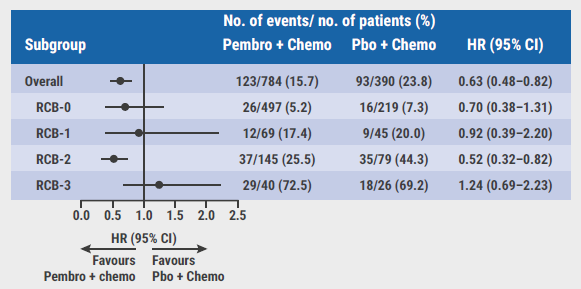https://doi.org/10.55788/8dd2975b
The phase 3 DETERMINATION trial (NCT01208662) randomised patients with newly diagnosed multiple myeloma to RVd alone (n=357) or RVd plus ASCT (n=365). After the induction phase, ASCT, and consolidation therapy, all patients received lenalidomide maintenance therapy. The primary outcome measure was PFS. Prof. Paul Richardson (Harvard Medical School, MA, USA) presented the results [1].
The median PFS was significantly improved in patients who underwent ASCT in addition to RVd therapy compared with those who did not (67.5 vs 46.2 months; HR 1.53; P<0.0001). Interestingly, this effect appeared to be more pronounced in patients with international staging system (ISS) I disease (HR 1.83) than in patients with ISS II (HR 1.38) or ISS III disease (HR 1.14). Also, patients with a high cytogenetic risk benefitted relatively more from early ASCT (HR 1.99) than those with standard risk (HR 1.38). Another remarkable observed subgroup difference was that Black patients (20% of the included patients; HR 1.07) benefitted less from early ASCT than White patients (HR 1.67). Furthermore, a preliminary analysis of MRD status showed that a higher number of patients in the ASCT group reached MRD-negative status (54.4% vs 39.8%) and that MRD-negativity was associated with longer PFS, regardless of received treatment. Importantly, after a median follow-up of 76 months, OS was not improved in the ASCT arm compared with the control arm (80.7 vs 79.2 months; HR 1.10; P=0.99).
RVd plus ASCT was associated with higher but mostly manageable rates of toxicity. In total, 1.6% and 0.3% of the patients experienced fatal adverse events (AEs) in the ASCT plus RVd arm and RVd alone arm, respectively. In addition, grade ≥3 events (94.2% vs 78.2%) and haematologic grade ≥3 events (89.9% vs 60.5%) were more common in the combination arm.
“The PFS benefit with early ASCT in the first-line treatment of patients with multiple myeloma reaffirms ASCT as a standard-of-care. However, the similar OS results for both treatment arms supports the use of a personalised approach. Furthermore, we should investigate the impact of quadruplet therapies and perform whole-genome sequencing analyses to gain better insights in which patients should be selected for ASCT,” concluded Prof. Richardson.
- Richardson PG, et al. Lenalidomide, bortezomib, anddexamethasone (RVd) ± autologous stem celltransplantation (ASCT) and R maintenance toprogressionfornewlydiagnosed multiple myeloma (NDMM): The phase 3 DETERMINATION trial. LBA4, ASCO 2022 Annual Meeting, 3–7 June, Chicago, IL, USA.
Copyright ©2022 Medicom Medical Publishers
Posted on
Previous Article
« Novel first-line treatment option for mantle cell lymphoma Next Article
Novel treatment option for KRAS wildtype pancreatic cancer »
« Novel first-line treatment option for mantle cell lymphoma Next Article
Novel treatment option for KRAS wildtype pancreatic cancer »
Table of Contents: ASCO 2022
Featured articles
Breast Cancer
Sacituzumab govitecan meets primary endpoint
Shaky OS results of palbociclib in ER-positive/HER2-negative breast cancer
Practice-changing results of T-DXd in HER2-low breast cancer
SET2,3 to inform on chemotherapy decisions in ER-positive breast cancer
Metastasis-directed therapy fails in oligometastatic breast cancer
Analysis by residual cancer burden further clarifies effect of pembrolizumab
Contribution of metastatic therapies on mortality reduction in breast cancer
Radiotherapy may be omitted in breast cancer patients
Promising data for ribociclib after progression on ET plus CDK4/6 inhibitors in HR-positive/HER2-negative metastatic breast cancer
7-gene biosignature: Benefits of endocrine therapy and radiotherapy in breast cancer risk groups
Lung Cancer
Additional tiragolumab does not help patients with untreated small cell lung cancer
Success for serplulimab plus chemotherapy in small cell lung cancer
Adagrasib safe and clinically active in non-small cell lung cancer
Long-term benefits of combined immunotherapy over chemotherapy in non-small cell lung cancer
Effect of KRAS mutations and PD-L1 expression on therapy response in non-small cell lung cancer
Melanoma
First results on distant metastasis-free survival in stage II melanoma
Higher response rates for concurrent triple therapy versus sequential therapy in melanoma
Genitourinary Cancers
Exploratory treatment options fail in ccRCC
Adjuvant everolimus did not benefit high-risk renal cell carcinoma
Cabozantinib fails as first-line maintenance therapy in urothelial cancer
177Lu-PSMA-617 is a valid treatment option for PSMA-positive mCRPC
Enzalutamide performs well in metastatic hormone-sensitive prostate cancer
Haematologic Malignancies
Autologous stem cell transplantation plus RVd improves PFS in multiple myeloma
Novel first-line treatment option for mantle cell lymphoma
Promising results for novel CAR-T therapy in relapsed/refractory multiple myeloma
Gastrointestinal Cancers
Panitumumab beats bevacizumab in RAS wildtype left-sided metastatic colorectal cancer
Spectacular results for dostarlimab in mismatch repair deficient rectal cancer
Triplet chemotherapy beats doublet chemotherapy in colorectal cancer liver metastases
To resect or not to resect primary tumours in stage IV colon cancer?
Novel treatment option for KRAS wildtype pancreatic cancer
Gynaecological Cancers
Primary results of rucaparib in ovarian cancer
Trabectedin not superior to chemotherapy in recurrent epithelial ovarian cancer
Encouraging results of relacorilant in ovarian cancer
Miscellaneous Topics
Bacterial decolonisation effective against radiation dermatitis
New standard-of-care for cisplatin-ineligible locally advanced head and neck squamous cell carcinoma
Ifosfamide is likely to be the go-to therapy in recurrent Ewing sarcoma
Dabrafenib plus trametinib candidates for standard-of-care in BRAF V600-mutated paediatric low-grade glioma
Related Articles


June 21, 2022
ASCO 2022 Highlights Podcast

© 2024 Medicom Medical Publishers. All rights reserved. Terms and Conditions | Privacy Policy

